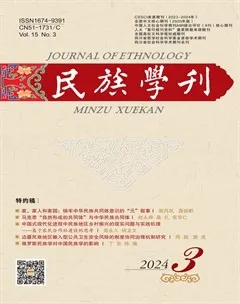Hom
2024-10-12XieDanfeng
(1. School of Marxism, Guizhou Normal University, Guiyang, 550001, Guizhou, China;
2. Guiyang College, Guiyang, 550005,Guizhou, China)
JOURNAL OF ETHNOLOGY, VOL. 15, NO.03, 01-09, 2024 (CN51-1731/C, in Chinese)
DOI:10.3969/j.issn.1674-9391.2024.03.001
Abstract:
Throughout the evolutionary history of the Chinese nation, a common belief system and a shared spiritual realm among diverse ethnic groups have been rooted in the concept of “home”. The notion of “home” can be defined as a rational narrative that firmly forges a strong sense of community for the Chinese nation. The nurturing function of family education and the influence of the familial traditions may facilitate the integration of the internal ethical concept and the external political value of the family and commix these with mainstream consciousness, laying a foundation of the core content, cultural psychology, and value pursuit of the sense of community for the Chinese nation, and constituting a theoretical framework that fosters a strong sense of community for the Chinese nation. At the same time, the daily practices within families — such as livelihood, education, and adherence to traditions — have organically constructed the practice form of forging a strong sense of community for the Chinese nation.
The ethical principles and moral order constructed by “familial” relationships are considered an ethical narrative for forging a strong sense of community for the Chinese nation. The concept of “family” contains the virtuous elements of norms, loving bonds, and mutual support, which makes up the essential foundation of a “home”. Consequentially, such an ideal and harmonious ethical framework includes the construction of standards for ethical obligations and moral conduct. In addition, the concept of “family” could be viewed as an ideological foundation of consolidating a strong sense of community for the Chinese nation. Research, moreover, demonstrates that in China this family ethic of “affinity” and love within the “family” has been continuously deepened, derived, and expanded. These family principles have then been transformed into political ethics and public ethics through moral empathy and rules, and finally internalized as common beliefs and ethical cultural norms of the Chinese national community, integrated universally within its social fabric.
Based on the above, it can be argued that the common spiritual home of the Chinese nation serves as a “field” of collective memory for forging a strong sense of community for the Chinese nation. Furthermore, this collective memory of the spiritual home of the Chinese nation has been passed down and extended in time and space, which ensures the transmission, preservation, and continuous evolution of the space-time interaction of the sense of community for the Chinese nation. It represents a deeply philosophical narrative for forging a strong sense of community for the Chinese nation.
In conclusion, this article maintains that a macro-theoretical framework for forging a strong sense of community for the Chinese nation needs to be supported by a “meta” theory at the micro-level. From “establishing” and “cultivating” to “forging”, the sense of community for the Chinese nation originates in the meta-narrative of “home”. This is embodied in the micro-field of cultivating virtue through familial education, shaping the ethical and moral standards rooted in daily life, and building the spiritual home of the China nation. Therefore, the interconnected narratives of home, family, and homeland arguably constitute the meta-narrative of forging a strong sense of community for the Chinese nation, providing theoretical support for the construction of a macro discourse system for the Chinese national community.
Key Words:
home; family; homeland; sense of community for the Chinese nation; meta-narrative
